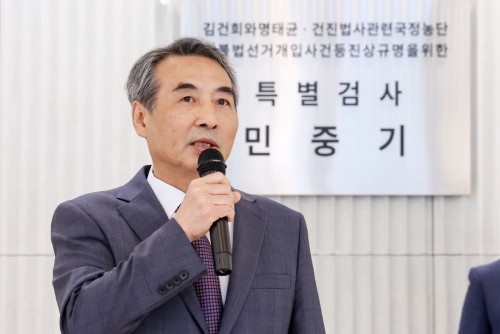 |
| Special Prosecutor Min Jung-ki speaks at the unveiling ceremony for his investigation team’s office sign at KT Gwanghwamun Tower in Seoul on July 2. Min is under fire over allegations of insider trading involving a firm also linked to First Lady Kim Kun-hee. / Source: Yonhap News |
Min Jung-ki, the special prosecutor leading the investigation into First Lady Kim Kun-hee, is facing growing scrutiny over allegations of insider trading after reports surfaced that he profited from shares in a company linked to the very case he is investigating.
Min allegedly earned about 100 million won by selling shares of NeoSemitech, an unlisted solar materials company, just before its stock trading was suspended in 2010. The company was later delisted following an audit refusal from its accounting firm. The revelation has prompted accusations that Min may have used non-public information—a potential case of insider trading.
Adding to the controversy, NeoSemitech’s CEO was a former high school and college classmate of Min’s, raising further questions about possible conflicts of interest. Compounding the issue, Kim Kun-hee herself had once invested in the same company, meaning both the special prosecutor and his key investigation target were involved in the same controversial stock.
The opposition Democratic Party announced plans to file a criminal complaint against Min for using undisclosed information, calling the situation “a collapse of the judicial system” in which “a suspect is investigating another suspect.”
According to records, while more than 7,000 individual investors suffered losses totaling about 400 billion won after NeoSemitech’s delisting, Min sold his holdings just before trading was halted, turning a significant profit. The company’s CEO, identified only as Oh, was sentenced to 11 years in prison in 2016 for accounting fraud.
Adding to the suspicions, attorney Yang Jae-taek—who served as an outside director of NeoSemitech and resigned shortly after trading was suspended—is also a classmate of Min’s from the 14th class of the Judicial Research and Training Institute. With several of Min’s associates linked to the company, critics are questioning whether Min’s investment decisions were informed by insider information.
The controversy has grown especially sensitive because Kim Kun-hee, during her August questioning by Min’s team, denied involvement in the Deutsche Motors stock manipulation case. Investigators reportedly raised her 2009 investment in NeoSemitech’s bonds with warrants (BWs) as part of a broader probe into her financial dealings, suspecting she may have benefited from privileged access before the stock’s planned listing.
In response, Min has denied any wrongdoing, saying he sold the shares on the advice of a brokerage employee. The special investigation team explained, “Min invested about 30 to 40 million won in NeoSemitech around the early 2000s through a personal acquaintance, and sold his stake for about 130 million won in 2010 following a recommendation from his securities broker.”
Most Read
-
1
-
2
-
3
-
4
-
5
-
6
-
7





















